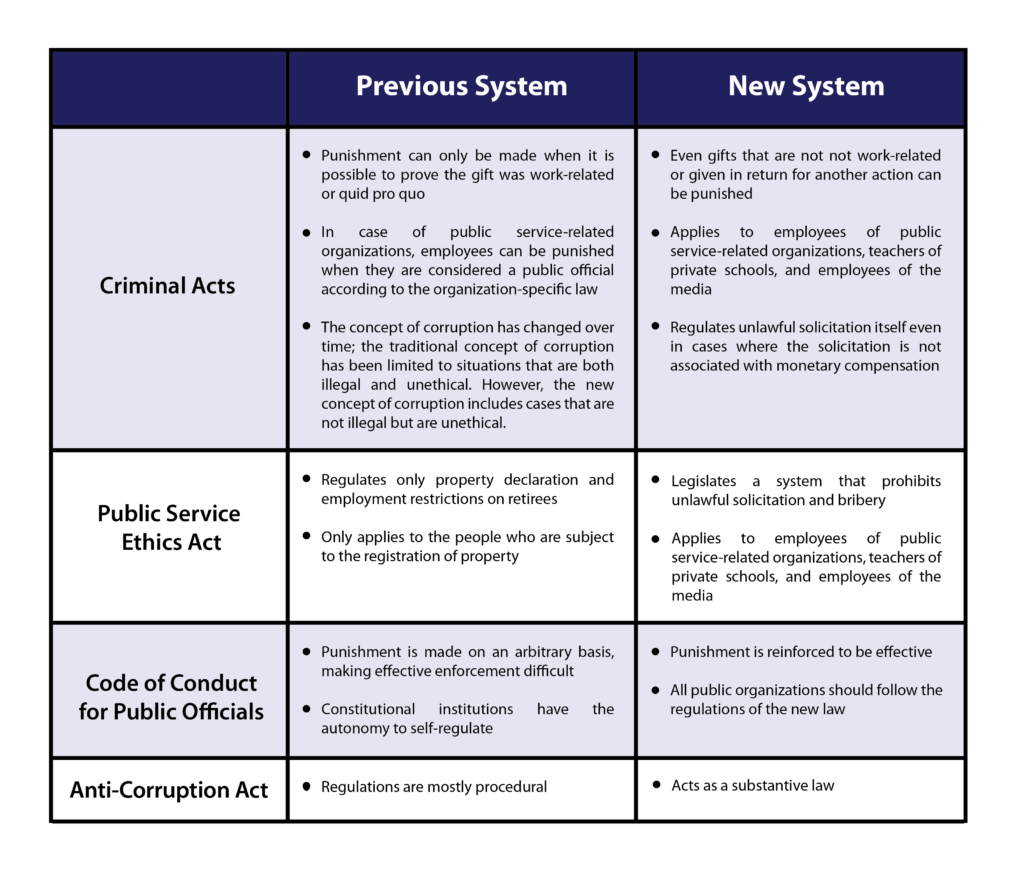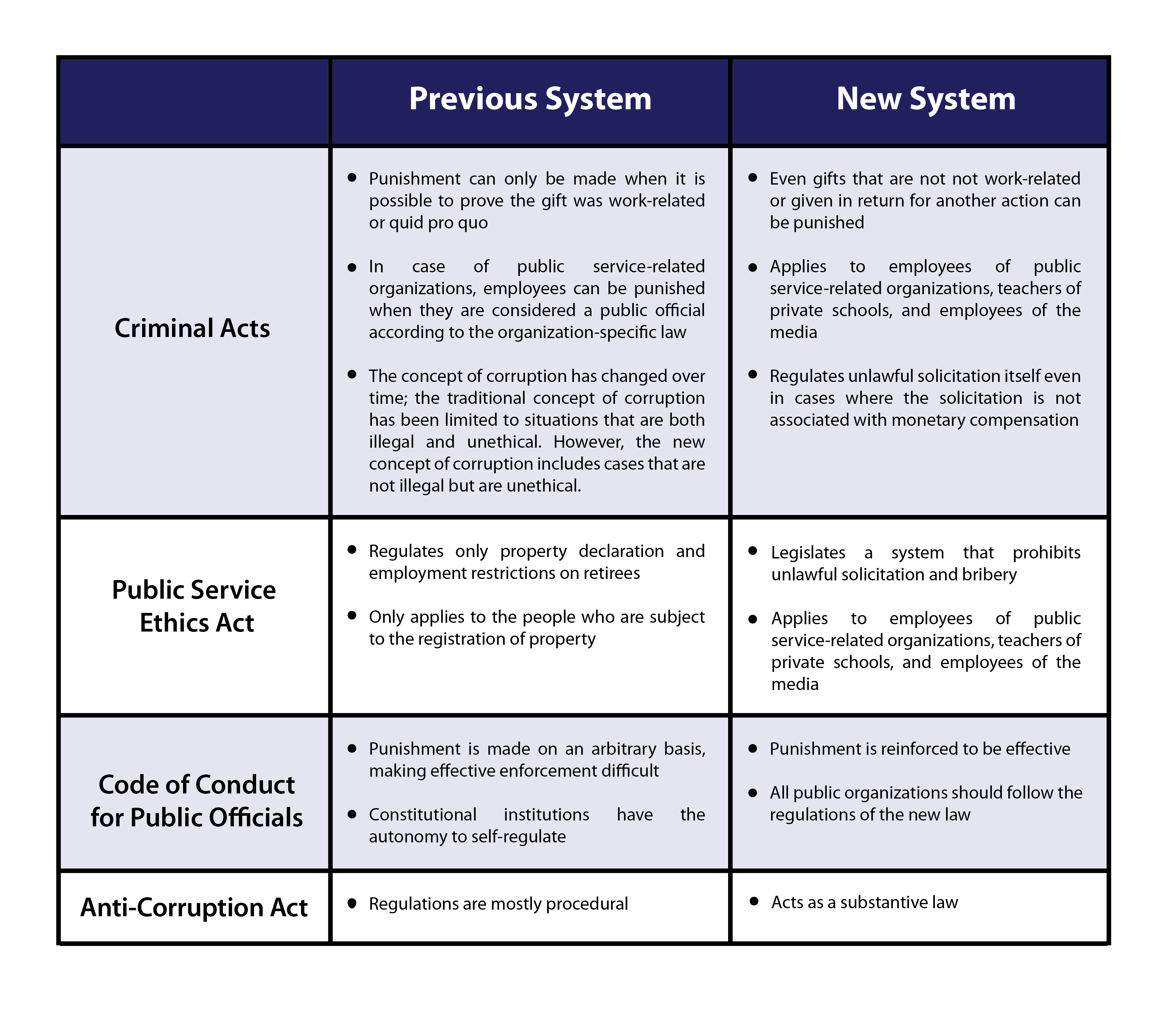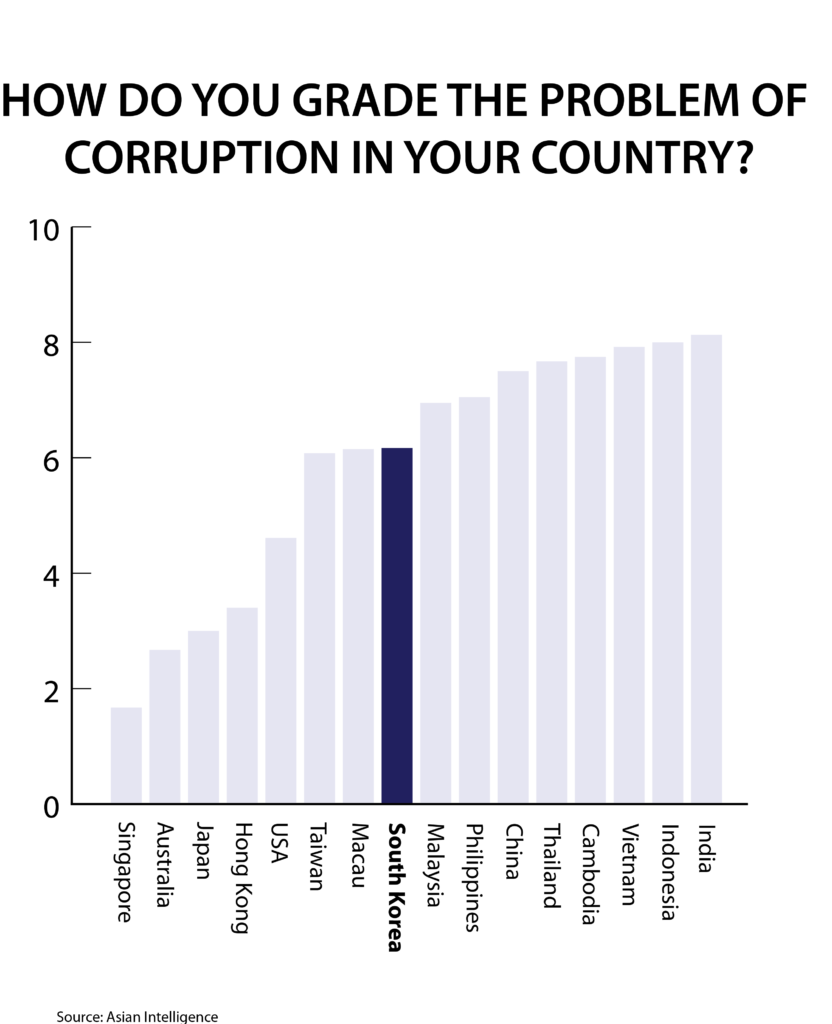The Peninsula
To a Clean and Honorable Society
Published November 15, 2016
Category: South Korea

By Nayoon Lee
Two seemingly unrelated events point to a larger problem in Korea. In 2011, a prosecutor was caught for accepting a Mercedes Benz and a Chanel bag from the opposing lawyer. The lawyer and the prosecutor asserted that they were in a relationship, and the court decided the prosecutor was not guilty. What makes this story more interesting is that the same lawyer had already been determined guilty and received probation in February of the same year for giving a bribe in a different case. In the case of many other countries such as Hong Kong and Germany, if the defendant is an attorney-at-law, the defendant is held to a higher standard concerning solicitation, or the act of requesting money or a gift.
And on April 16th, 2014, the ferry ‘Sewol-ho’ sank into the sea, causing the deaths of approximately 300 people in South Korea. After the inspection, the National Maritime Policy Agency concluded that the main reason why the ‘Sewol-ho’ sank was because the inspection that must be done before the departure wasn’t done properly. It turned out that the CEO of the ferry company paid the inspection company so that they could load more than the amount that is legally allowed.
What these two cases have in common is that they both reflect corruption in Korean society. Enactment of “The Improper Solicitation and Graft Act (anti-graft law)” was first suggested after the incident in 2011. This legislative movement subsided as time passed. However, the sinking of the Sewol raised the issue again. On September 29th, 2016, “The Improper Solicitation and Graft Act (anti-graft law)” went into effect in South Korea.
According to a survey done by the Anti-Corruption and Civil Rights Commission of South Korea in 2015, 36.3% of citizens, 46.1% of public officials, 42.3% of businessman, and 33.8% of foreigners responded that they think South Korea’s traditional solicitation culture is the primary reason for the corruption within society. Additional statistical data provided by the Anti-Corruption and Civil Rights Commission of South Korea showed that 57.8% of the general public perceive public officials as corrupt. An intriguing aspect about this survey is that contrary to the general public, only 3.4% of public officials responded that they perceived public official in Korea to be corrupt. This statistical result also implies that solicitation has been persistent long enough for public officials to consider it acceptable. From an international perspective, this is more likely to be seen as a sign of corruption rather than a clean society.
To raise awareness among the public regarding unlawful bribery and solicitation, the anti-graft law has been established, imposing various but more effective and restrictive changes to the previous legal system. The changes include the following:
Although it may be too soon to conduct statistical research to test how South Korean society has changed since the implementation of the anti-graft law, there have been many interesting changes. Golf courses reported that 80% of their customers have cancelled their reservations. For holiday presents, new products are being sold below the price limit (which is around US$50) for gift giving. The price of Hanwoo, Korean domestic beef, dropped from 19,189 won (US$18) per kilogram in September to 15,845 won (US$14) per kilogram in October. NS Mall, a well-known company in the home-shopping industry, postponed their employee recruiting schedule from this coming November to the January of the next year. This change was made considering students will be graduating in February 2017. Traditionally, students that are accepted as employees have asked professors for excused absences to start working before they graduate. However, this might be considered illegal under the new act.
According to research done by Asian Intelligence, South Korea scored 6.17 out of 10 for societal integrity (1 having the most integrity). Among the countries included in this research, Singapore was first with 1.67. Australia, Japan and Hong Kong also scored relatively low.
Korea may look towards Hong Kong and Singapore for examples on how to build integrity. Unlike South Korea, Hong Kong and Singapore do not allow facilitation payments, a payment made to public officials to expedite services. Hong Kong does allow gifts that are a maximum HK$250 (approximately US$30). They also make an exception for traditional gifts with a maximum value of HK$1,500 (approximately US$200). Also, if the gifts are given in circumstances where it is related to the official position of the public official, specific permission must be sought beforehand. Meanwhile, what makes Singapore the cleanest and the most incorruptible society is that its law aims to stop corruption before it happens. Not only does it regulate the corrupt action that has already taken in place, but also it punishes the attempts to commit a corrupt act.
There has been much confusion in Korea since the anti-graft law has been put into effect. As it has only been a short while, this confusion is expected to last longer. Some argue that we need to mitigate the regulations to some degree. However, comparing with the law of Singapore and other countries with higher integrity, Korea should consider stricter regulations such efforts to stop corruption before it happens to create a better society. Considering the original intention of the law and the positive movement that this law will bring to society, South Korea should bear with current situations and move forward to incorporate a higher level of integrity into society.
Nayoon Lee is an intern at the Korea Economic Institute of America and a student of the Yonsei University School of Business, Seoul, Korea. The views expressed here are the author’s alone.
Photo from v15nben’s photostream on flickr Creative Commons.


